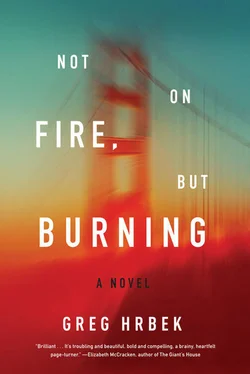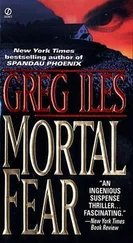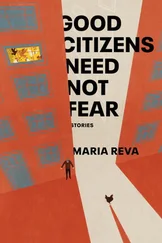I heared something, Momma.
Me, too.
I can’t know it.
Maybe a deer, she says to him. Unable to tell if he is frightened. She is. Will be, she knows, for a long time to come, perhaps for as long as there is …
For a long month he has done nothing but stare at the lines of a notebook, pen unmoving in his hand, or at the computer, on the screen of which a few purposeless lines will dead-end at the blinking cursor that in its appearing and disappearing is almost audible, like the ticking of a clock. Mitchell Wakefield has never been prolific. The words never come easy, and ideas (those worth pursuing and committing to the page) are like creatures that live countless leagues under the sea, rarely seen, and then only after thorough preparation and a long descent into the medium; and even if you make it to that dark quiet place where things luminous can show themselves and reveal forms theretofore unimagined, you might wait and wait and nothing will come visible. This is what he’s doing in the basement, in his study — staring at the computer screen in the dark, waiting (ears filled with streaming audio of the crashing of ocean waves and the voices of seagulls) — when suddenly his younger son is standing in the doorway as abruptly as a ghost.
“ Jee zus, Dorian!”
He says something in response; Mitch removes the canalphones and says, “What?”
“I was talking but you didn’t hear me.”
“Sorry.”
“You have waves on?”
Mitch nods. The sound is audible, though faint as a secret being whispered into a single ear.
“So, you’re writing …”
“Dodo, do you know what time it is?”
“I’ve been standing here for about three minutes, so it’s probably about one forty-five. Can I sit down?”
As Dorian sits beside him on the couch, Mitch minimizes the document.
“I thought you were writing.”
“Not really.”
His son picks up the canalphones and inserts them in his own ears. Then leans into Mitch, a childlike thing he rarely does anymore. By the end of the year, he’ll be twelve — and one day soon thereafter (just as it happened with his older son), Mitch will understand that the child has gone missing and won’t ever be found. He puts an arm around him. Can’t hear the ocean any more and yet he can; his ears seem to echo like seashells. Probably a bad dream , he thinks. Dream about her . Trying to think: Should I ask. Or just be here quietly … In therapy, Dorian has told about the dreams, which point with the fixation of a compass needle to the same place and time, same landscape of destruction, same fear. “But what is he scared of?” And the psychiatrist had taken a breath and said something like: “In terms of fear, he’s afraid that the world is going to end. He thinks a lot about 8-11, and he worries it’ll happen again, or something just as bad — chemical, biological — or something even worse. This isn’t abnormal. We’re all afraid, to differing degrees. At the most extreme, the fear becomes a phobia. Your son,” he went on, “isn’t phobic. He doesn’t have the associated anxiety or the physical symptoms.” “But the girl,” Mitch and Kathryn said. “Who is not just a dream to him. Who he believes was a real person (isn’t that a delusion?) and whom he believes is being hidden from him (isn’t that paranoia?), and aren’t these signs—? What we mean is, we’ve read that there’s an early-onset form of schizophrenia.” To which the doctor replied: “Or perhaps he simply has a highly imaginative mind.” He went on to discuss the concept of paracosms: imaginary worlds, fantasy worlds conceived in childhood. Often by gifted children. Usually to process and understand a loss, like the death of a loved one. “In Dorian’s case, there hasn’t been any loss. But we also might say: There hasn’t been one yet . He’s afraid of what might happen. This we know. Perhaps afraid enough that his mind is reacting ahead of time. The fantasy is helping him process his fears about the future.” The explanation sounded conclusive, and Mitch glanced then at Kathryn, whose face was somehow both brightened by faith and lined with skepticism. “That makes sense,” Mitch said. The psychiatrist lifted an eyebrow, as if changing his mind, and said: “But we can’t rule out every other possibility right now.” Then one day, a few weeks later, a few therapy sessions later, Dorian told them that the dreams had stopped. The last two months of the school year passed quietly. Not another accusation, no mention of the girl. Until the other day at breakfast. Now here they are, father and son, at two in the morning, awake, the computer fallen asleep before them, dreaming a slideshow of photos …
Autumn past, Dorian at the entrance to a corn maze.
Last month, Cliff in a cap and gown.
Then a long-ago picture Mitch can’t quite place. On a beach. He and Kathryn and Cliff. Cliff maybe three. All of them lying in the sand. Faces close up, looking into the camera, chins resting on their hands. All smiles while a blue ocean wave crests in the background — and Kathryn is wearing huge sunglasses he doesn’t recall her ever having.
“California,” Dorian says.
“Looks like— Yes, must be California.”
The picture fades, replaced by another much more recent and recognizable. School play from last year. Dorian, fake-bearded, and Plaxico, wild-wigged: Abraham Lincoln and Frederick Douglass.
“About last night, Mitch says. I think your mother was a little hard on you.”
“A little.”
“The thing is, she’s basically right. We need to live with people. And not just tolerate them. Be friends with them. Go to their parties once in a while. You know what Lincoln said about the better angels of our nature. This is just one of those times when you have to be a better angel.”
“I don’t know anything about Lincoln.”
“Sure you do.”
Pictures form and unform. They are like keys. Every picture opens a lock in the mind. Depending on the image, the room gets somewhat brighter or darker — a slow strobe, conducive to entry into suggestible states.
“Who took that picture,” Dorian asks suddenly.
“That one?”
“No, the one on the beach.”
“Who took that. I have no idea. Probably some friend I haven’t spoken to in ten years. Maybe the Magic Paparazzi.”
“I’m too old for that joke,” he says.
“Okay.”
“It wasn’t the timer. You can tell from the angle. Someone was lying down in front of you.”
“Didn’t notice.”
His son breaks from the embrace and sits forward and asks: “Can you go back to it?”
“The saver’s on random shuffle.”
“Well, let me look through the folder, then, okay?”
“No, not okay.”
Dorian turns to him. Against the dim backlight, Mitch can’t make out the expression. Not yet thinking: He thinks she took it. That thought is buried, hidden below the surface of his confusion about what his son wants with the picture.
“Why not.”
“First of all,” Mitch says, “it’s two in the morning. Second, there are a lot of old pictures in there.”
“So?”
“So maybe there are some I don’t want you to see.”
“Of what,” he says. “Of who.”
“Of who? Of your mother. And that’s not a dis. There really might be naked pictures of her in there. From back in the day.”
And Mitchell Wakefield isn’t just making excuses. Because recently he has found a flash drive (lost and forgotten until the finding, like an arrowhead unearthed thirty summers ago in the woods in Connecticut), and discovered saved to it a folder of photos. The one on the beach is from that folder, as is another which has already surprised him: of Kathryn before children (after the abortion but before the marriage, in the tweens of the century) on the observation deck of the Space Spire, her hair long and blonde and frenzied by a gust of wind. That picture fit smoothly into the lock it was fashioned for. When Mitch rediscovered it, the cylinder of memory turned, and he saw himself and her, twenty-four or — five, driving north on the coast road of the Oregon Territory, and he could recall how at that time (after she had confessed about him and what she’d done about the pregnancy) — how emotions had seemed conjoined, as if love and anger shared a heart …
Читать дальше












